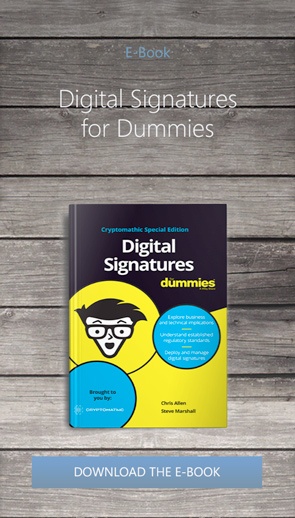5 min read
Electronic Signatures: Which Industries Must Use E-Signatures?
Cryptomathic : 22. July 2022

- Home >
- Electronic Signatures: Which Industries Must Use E-Signatures?
Certain industries have a duty to protect confidential information, as well as a requirement for authentication - proving that a document was sent by a particular person. In this article, we will not be looking at why specific industry sectors SHOULD use electronic signatures. Instead, we highlight some key use cases to educate the reader on where and why certain sectors NEED to use them.
Every industry is looking to optimize its workflow operations, make savings, and decrease waste. Investing in electronic signatures is a safe and cost-effective approach to accomplish the aforementioned. Furthermore, any sector that receives documents in a digital form will also require the necessary software to view, manage, and access documents. Preferably, all in one place.
Back to Basics
 Electronic signatures have become fairly standard for individuals in many online transactions. For example, signing a document, applying for an online bank account, submitting an electronic tax return, or signing an employment contract. Digital documents contain crucial metadata that can include additional information about the transaction - who signed, the date, and the location. As a result, all of this information contributes to creating a concise digital audit trail. This, in turn, enhances operations and streamlines costs through reduced human error and a paperless operation, whilst ensuring that client data is safe and secure.
Electronic signatures have become fairly standard for individuals in many online transactions. For example, signing a document, applying for an online bank account, submitting an electronic tax return, or signing an employment contract. Digital documents contain crucial metadata that can include additional information about the transaction - who signed, the date, and the location. As a result, all of this information contributes to creating a concise digital audit trail. This, in turn, enhances operations and streamlines costs through reduced human error and a paperless operation, whilst ensuring that client data is safe and secure.
A signature policy is a set of rules for the creation and validation of an electronic signature, under which the signature can be determined to be valid. A given legal/contractual context may recognize a particular signature policy as meeting its requirements. The signature policy may be explicitly identified or may be implied by the semantics of the data being signed and/or other external data, like a contract being referenced which itself refers to a signature policy, as well as by the signing context. An explicit signature policy for open usage has a globally unique reference, which is bound to an electronic signature by the signer as part of the signature calculation.
eSignature standards
|
eSignature Standard |
Simple |
Advanced (AES) |
Qualified (QES) |
|
Transaction Risk |
Low |
Medium |
High |
|
Description |
These are the most general and basic forms of electronic signatures which covers the broad spectrum of all electronic signatures. Simple e-signatures do not need any form of identification verification from the signer, and the individual receiving the document is responsible for having trust in these signatures. |
Advanced Electronic Signatures, unlike simple electronic signatures, require a level of identification verification. They are based on certificates that uniquely link the e-signature to the document or transaction through a series of authentication processes that give it legitimacy and validity. |
Qualified Electronic Signatures are similar to advanced electronic signature standards. The regulation requires a qualified certificate stored on a qualified signature creation device and must be issued and managed by a QTSP (Qualified Trust Service Provider), and it attests to the authenticity of the electronic signature to serve as proof of the signatory. |
|
Typical Uses |
Standard contracts and agreements, all general consent forms. |
Agreements, legal documents, online bank data, and funds transfers. |
Commercial and residency transactions, calls for tender, and business documents. |
The Qualified Electronic Signature (QES) is the most complete and secure method to digitally prove the identity of a subject and the acceptance of the content of a document.
 A Qualified Electronic Signature is an e-signature created with a qualified certificate to identify the signer. This qualified electronic signature certificate comprises an electronic document that links the signer's data and the validation of the QES signature to the irrefutable identification of the subject.
A Qualified Electronic Signature is an e-signature created with a qualified certificate to identify the signer. This qualified electronic signature certificate comprises an electronic document that links the signer's data and the validation of the QES signature to the irrefutable identification of the subject.
The qualified certificate means that the qualified electronic signature would not require any form of expert evidence in a court of law in the event of a dispute since it is considered a piece of totally valid evidence with the highest level of legitimacy, originality, and inviolability required.
Why These Industries Must Use Electronic Signatures
The following list contains prime examples of electronic signature use cases:
Banking & Financial Services
- Online banking - a typical use case is the signature of bank transfers via banking apps where the user’s private key is required to sign the transfer.
- To digitally sign legally binding transactions from a PC or online device from remote locations, such as bank account openings, loan applications, and mortgage services.
- To fulfil the requirement to protect personal data in the form of account numbers, PIN numbers, and passwords.
Insurance Sector
- To apply for various types of insurance online.
- To enable swift and streamlined contract and coverage renewals.
- Electronic contracts detail accurate information. This means that claims can easily be verified and customers can be held for breach of contract in certain cases.
- Provides the option to electronically report a claim which also involves a signature and timestamp.
E-Commerce
- To streamline business-to-business transactions where contracts need to be signed. Geographical locations could vary from business to supplier. Therefore, online contracts need to be completed using electronic signatures.
- Many online transactions are considered to be ‘contracts’ upon completion of the transaction, therefore authentication and security are paramount.
eInvoicing & Compliance with the EU VAT Directive
- eInvoicing enables public sector contractors and companies to receive and process electronic invoices that comply with the European Standard. Therefore, invoices sent or made available by electronic means need to prove the authenticity of the origin and the integrity of their content. This needs to be guaranteed by either an advanced electronic signature or by means of an electronic data interchange (EDI). See Article 233 of the EU VAT Directive for further information.
- Certain EU Member States may also ask for the advanced electronic signature to be based on a qualified certificate and created by a Qualified Signature Creation Device (QSCD).
eHealth
- Various privacy laws protect personal information. Laws concerning the processing, storage, and privacy of sensitive data need to be met at all times.
- Provides electronic signing of contracts for patients, vendors, employees, physicians, and other third-party organizations.
- Insurance claims that are health-related - an electronic signature software system would ensure that claims payouts are streamlined.
The Legal Industry
- Fulfilling contracts and agreements. Delays are avoided as timescales are streamlined. Furthermore, legal documents are constantly revised, and therefore, revisions and signatures can be made remotely and with minimal effort.
- In a court of law, contractual evidence cannot be rescinded when proven that a certain person has electronically signed the contract.
The Retail Industry
- Online and instore purchases, as well as payments across suppliers, vendors, and employees.
- Securing card payments across the payment network and the flow of components that include the cardholder, the merchant (the store, restaurant etc), the issuer (the bank that issues the card), and the acquirer (that provides the tools to process card transactions).
Government Sectors
- Public services - provision of electronic applications and payments for government services ranging from housing agreements to waste disposal.
- Submitting declarations to the government (which needs to be signed by a mandated person).
- The option to electronically sign internal agreements.
- The ability to electronically sign third-party contractual agreements, such as building work and materials, electricians, and plumbers.
- ID- electronic passports.
Property & Conveyancing
- Registration of transfer deeds or other forms of dispositionary deeds can be electronically signed, as a Qualified Electronic Signature is deemed legally identical to a wet signature.
Accountancy and Tax
- The ability to complete online tax returns where the tax declaration is signed locally by the taxpayer/ account holder.
- To fulfil employee contracts.
- Remote signing of contracting agreements.
Conclusion
910/2014 European Union Regulation regarding electronic identification and trust services, known as eIDAS (electronic IDentification, Authentication and trust Services), describes the different types of electronic signature.
eIDAS regulations prohibit EU member states from requiring a higher-level signature. There is no higher form of digital signature than the QES qualified digital signature (specified in eIDAS Article 27).
It is apparent that employing remote QES to streamline business processes will benefit multiple industries. In other circumstances, there are numerous electronic signature use cases where it is a ‘MUST HAVE’ rather than ‘a nice to have’ if a business intends to remain competitive in the age of digital transformation.
Cryptomathic Signer is a remote QES solution, incorporating Cryptomathic's certified Qualified Signature Creation Device (QSCD), which abstracts all the complexity and helps all industries to provide a smooth digital signing experience to their clients.
